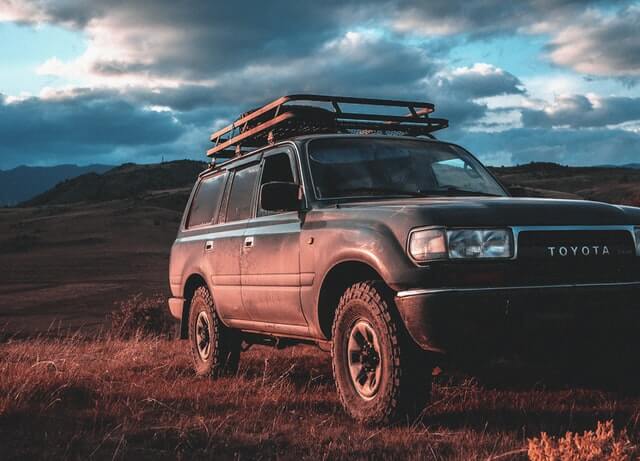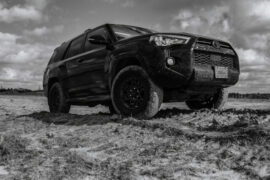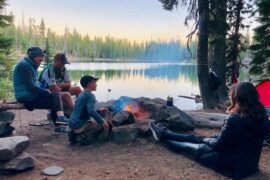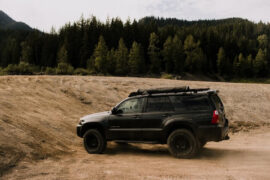Last Updated on January 30, 2023 by Rose Morah
Overlanding can be expensive, especially when you are a beginner.
In this article, we are going to discuss how to go on an Overlanding adventure without having to dig deeper into your pockets.
But first, personally, I believe that Overlanding is not all about spending a ton of money on trendy accessories or big 4WD rigs.
It is all about experiencing what land and mother nature in general, has to offer.
Related:
How to Find Overlanding Trails (Best Tools & Resources for Finding Trails).
9 Most Important Overlanding Tips and Tricks (A Beginners Guide).
- Tips to start Overlanding on a budget
- 1. It does not matter what you drive
- 2. Tires should be your biggest expense
- 3. Focus on getting minimal Overlanding gear
- 4. Consider different sleeping alternatives
- 5. Budget for your fuel/gas
- 6. Properly budget for your food
- 7. Plan for emergency roadside assistance service in advance
- 8. Budget for maintenance
Tips to start Overlanding on a budget
1. It does not matter what you drive
Most people tend to think and believe that you can only go Overlanding with 4WD rigs. But I can assure you that’s entirely not true.
If you are on a tight budget, you can take what you currently have for starters.
For example, I started out with a 2WD and took it on so many Overlanding trips. And it performed very well.
Additionally, I have seen so many people Overlanding with a 2WD in almost every place that I have visited in the past.
Wondering how this is possible?
Remember it is not about what you are driving. What matters is your primary goal.
That said, if you are planning to go to National Parks and BLM lands, the 2WD will be reliable as long as it has a decent ground clearance.
National Parks and BLM lands are some of the best places to start if you are a beginner before heading out to the toughest terrains.
Therefore, if you have been longing to go on Overlanding adventures but never tried because in your mind you’re thinking that you need to first buy those big 4WD rigs, you’ve been missing out big time.
See these 14 Cheap Off-road Vehicles (For off-road & Overlanding Adventure).
Buying A Used Jeep Wrangler JK? See What To Know & Look Out For.
2. Tires should be your biggest expense
No matter how tight your budget is, great tires are a must-have when Overlanding.
If you want to have an enjoyable Overlanding experience, then I suggest you spend money on good quality all-terrain tires.
They give you more traction when driving off-road and reduce the probability of getting a puncture or tire tear during the journey.
Check How to Choose the Right Tire Size and Wheels (A Complete Guide).
The same goes for the spare tire. And it should also be full of air once you are set to go Overlanding.
Additionally, be sure to get a decent tire compressor and an emergency tire kit for changing your tires.
See the Tire Pressure Guide: What is the Proper Tire Pressure For Vehicles?
Check out also The Best Jeep Wrangler Build Sheet For Beginners (A Complete Guide).
3. Focus on getting minimal Overlanding gear
When it comes to Overlanding gear, I highly recommend that you only get gear for survival. Simplicity is key when Overlanding on a tight budget.
I have seen many people buy lots of gear that they barely use most of the time.
Additionally, when buying gear try to get one that you can be transferred to your next vehicle in the future.
Unfortunately, most of the time this is hard for Overlanding beginners because it is easy to convince yourself that you need some gear while in the real sense you actually don’t need it.
I believe the following are some of the Overlanding gear that is worth spending money on based on our research and experiences:
- Camping gear
First of all, when it comes to your Overlanding camping gear, you actually don’t need the following:
i). a $500 tent or even a rooftop tent, which is actually more expensive compared to some good quality ground tents.
ii). An expensive bed pad.
iii). A pull-out kitchen.
iv). A 12v fridge.
The following are some camping gears that would be worth getting;
i). A topper.
They are mostly great for stealth camping.
ii). Mattress protector.
iii). Tow straps and hooks.
- Recovery gear
Recovery tools are great for any off-road trip especially if you plan on getting off the beaten path. A good example of these includes;
i). A good tool kit.
ii). First Aid Kit.
iii) Tire repair kit.
iv). A battery jump pack.
v). Tow rope
vi). Tire chains or any other good alternative to help you in case you get stuck.
All the above gear should work perfectly fine if your main goal is to explore, enjoy the fresh air and spend great quality time Overlanding.
However, if your goal is to flex on Instagram, then you will definitely need to spend more on gear.
Check out A Complete Overlanding Trip Checklist.
See also: 10 Best Off-Roading Tips For Beginners.
| NOTE: After a number of Overlanding trips, your Overlanding checklist may grow or reduce with time as you discover what you really need and what you don’t. Additionally, it is easy for Overlanding enthusiasts on YouTube to wanna make you feel like you need some gear. But in most cases, you will not actually need it. |
You may also like:
How To Use Gaia GPS (A Complete Guide).
Pros and Cons of onX Maps, Trails Offroad VS. Gaia GPS.
4. Consider different sleeping alternatives
If you have gone camping before, you are probably aware of how hard it is at times to find legal places to set up your tent and sleep or free places to sleep.
When I was just starting out a few years ago, I remember spending extra unbudgeted money paying to sleep at some sites.
But over the years I learned the hard way the importance of:
- Being familiar with your routes/trails. This can be through reviews or mapping your route.
- Considering different sleeping alternatives and being flexible.
Depending on where you are going, there are places that are best for sleeping in the car while some are great for tent camping.
This is why I highly recommend that you properly plan your trip.
For instance, if I am going on a long trip, I consider sleeping in the car an option. This is because when I’m tired I can stop at a truck stop, set up my sleeping gear, and sleep in the car.
Check out our article on what you need to know before you sleep at a truck stop.
| NOTE: Sleeping in the car on a non-level surface can be uncomfortable. Therefore, remember to carry/get a set of leveling blocks if you plan to sleep in the car. Additionally, find out if you can get free campgrounds along your route and at your destination. |
See the Best Cars To Sleep In (Tips From Avid Campers).
5. Budget for your fuel/gas
Well, instead of using most of your money on excessive gear, I would highly recommend you use it to fill your gas tank.
This makes a lot of sense, especially when you are planning an Overland adventure on a tight budget.
Other tips to help you spend less on gas/fuel:
- Start with the nearest Overlanding destinations.
This means that you will not have to drive for long hours and it will definitely cost you less on fuel consumption.
- The weight of the vehicle affects your fuel/gas consumption.
If you decide to take it to the next level and carry lots of gear, this will undoubtedly affect your fuel consumption and you will eventually spend more on fuel.
| NOTE: When you are going on an unfamiliar route, especially in rural areas, I highly recommend you find out where the next gas station is before passing a gas station. |
Find out How To Calculate The Average Cost Of A Road Trip.
6. Properly budget for your food
As mentioned earlier, you don’t need to buy a 12V fridge because a good cooler will work just fine.
Additionally, how much you spend and where you store your food will definitely depend on the number of days you are going to be Overlanding.
One other amazing tip when it comes to your camping food is carrying foods that do not spoil easily.
We have a detailed article on How To Keep Perishable Food Fresh and Frozen When Traveling For Long Hours.
7. Plan for emergency roadside assistance service in advance
For peace of mind when Overlanding, I recommend getting a roadside assistance cover. This is a worthy investment that really comes in handy in case of an emergency.
You also like these 15 Best Portable Showers for Camping (Must-Have Accessories).
8. Budget for maintenance
Always budget for the unexpected, especially if know you are going to use your vehicle for more future Overland expeditions.
In conclusion, Overlanding requires proper planning, especially when you are on a tight budget.
The main things that actually matter most when Overlanding is the destination, storage, recovery gear, shelter, and weight.




